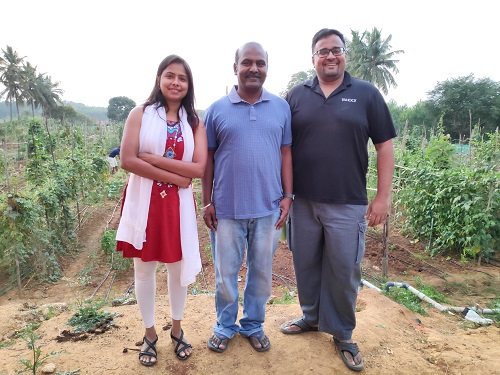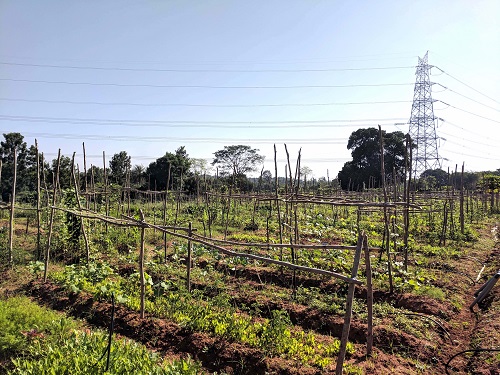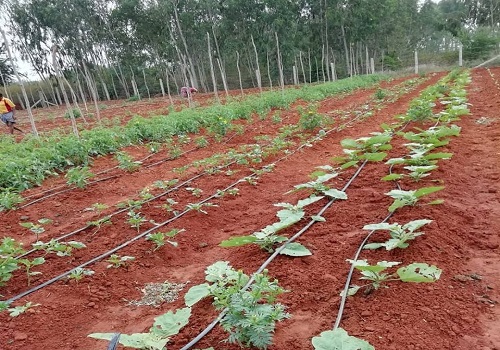Farm, Together
Ever looked at lush, green farms and wished that one day you could bring home a basket of fresh vegetables and proudly stake claim of your green thumb? If you have, then you know that you are not alone. While most city dwellers share the same dream, access to agricultural land, busy schedules and, most importantly, the thumb being not so green gets in the way.
What if I told you an app could change all of that? Farmizen-launched by Shameek Chakravarty, Gitanjali Rajamani and Sudaakeran Balasubramanian- is bringing agriculture and farm fresh organic produce to your doorstep.
I spoke to Shameek Chakravarty about Farmizen and using technology to create a win-win model for farmers and consumers.
The Idea
Farmizen was launched in June 2017, but the founders had been growing their food long before. Shameek’s wife Gitanjali, is also the founder of the urban gardening platform, Green My Life which provides gardening tips, equipment and garden maintenance services. Gitanjali and Shameek are avid terrace gardeners themselves.

Image Courtesy: Farmizen
In 2016, they decided to extend their expertise and rented out a small patch of land close to their home. They wanted to use the land to grow all their vegetables. “We asked a farmer there if he could give us a small patch of his land for our purpose. We requested him to water our patch every day, and we took care of the rest. It was an eye-opening experience for us. We were able to grow a lot of food this way,” said Shameek. They shared their harvests with close friends, and soon many of them expressed interest in doing something similar.
Entrepreneurship is not new to this team. Shameek has founded and advised many technology-based ventures before Farmizen. He and Sudaakeran also worked in Amazon previously. Gitanjali worked with TCS before starting her entrepreneurial journey with Green My Life. While working on their plot of land and discussing what their next entrepreneurial journey should be, the team realized that the answer was right in front of them. “It was very much a Eureka moment for us,” said Shameek.
They began working on the concept of Farmizen in January 2017.
The Execution
Although the team had already worked on the basics of the idea through their own experience, they made sure the concept was fine-tuned and spent six months developing the right technologies to support their model.
And the model being?
You can rent a 600 sq ft (containing 12 raised beds) patch of agricultural land in your city for a monthly fee. Through the Farmizen app, decide what you want to grow and monitor your patch of land. On the farm, farmers will tend to your land and make sure that your vegetables are taken care of. They get a monthly fee for the same. Work on your land and harvest the produce or wait for them to be delivered to you. How does that sound?
“We already knew that people were interested in this model. But we had to ensure that the model could function even if people did not have time to visit their farms and tend to their plots on a regular basis. The model needed a structured, process-oriented approach. Most importantly, there had to be an option for the produce to be delivered home,” said Shameek talking about the thought process behind Farmizen.
@farmizen founder Shameek Chakravarty on creating the right technological intervention between producers and consumers. #farmizenapp #techforagriculture Click To TweetFarmizen uses technology to break down communication barriers between farmers and consumers. By creating apps for farmers, consumers and for the delivery of the vegetables, Farmizen makes the entire process seamless.
From June to November 2017, the team tested the model with one farm and 79 subscribers in Bengaluru city. Today, the app has more than 10,000 downloads and Farmizen is also functional in the cities of Hyderabad and Surat along with Bengaluru- where they now work with about 20+ farming communities.

Image Courtesy: Farmizen
The Subscribers
Farmizen has found its tribe among consumers who want a direct, trustworthy source of food. For the founders what is more surprising is seeing some of their subscribers embrace this concept wholly.
“There are many consumers who take the vegetables home, cook with them and compost the waste. They use the compost for their patch of land. We hope more people do that and sort of close the loop. We also have many subscribers spending their weekends on the farms, bringing their family along and showing their children how vegetables are grown,” said Shameek. But the maximum percentage of subscribers come from people who don’t visit their farms too often. For them, it’s simply about finding a good source for their food.
https://www.instagram.com/p/BsZYFzpnP2d/
The Farmers
Getting the first few farmers on-board was the tough part, Shameek said, and they were skeptical about the model. But once farmers discovered the benefits, word spread around quickly. Today, Farmizen gets requests from farmers who want to adopt this model of agriculture.
“We work with farmers on a revenue share model. Farmers are responsible for land, labour and running the show on the ground. We are responsible for delivery, technology, marketing, customer service, seeds, sapling etc. We take care of the areas where typically farmers fall short. With Farmizen they make about 5-6 times what they would make otherwise as a profit per month. More importantly, the cash flow is predictable and on a monthly basis,” he said.
Agriculture and Technology
The founders of Farmizen want their venture to encourage a collaborative production process, and steer consumers away from a mindset where they simply purchase the food someone else is producing. Consumer education, Shameek added, is a less talked about factor among the many that plague our food and agricultural systems.
“When consumers see fruits and vegetables being available in the market year long, they don’t question it. People have gotten so used it. This causes distortions in the system because we are going against what is natural. Understanding how our food is grown is very important,” he explained.
https://www.instagram.com/p/BskvgCeHs_N/
Technology can help bring farmers and consumers closer without relying on intermediaries, Shameek said. “Consumer demand is not conveyed to producers and hence there is a mismatch in the market. Intermediaries misuse this gap. We need technology to address the mismatch. But above all, consumers should also be willing to adopt different models of production.”
Farmizen is looking to expand to more cities across the country like Chennai, Pune and Delhi NCR. As they bring this mutually beneficial agricultural model to more places, their bigger goal remains constant- “We need to build small, local, sustainable systems which work alongside nature rather than compete with nature’s resources.“
For more information visit Farmizen.
Cover Image Courtesy: Farmizen Facebook Page
You May Also Like
Aqua Connect- South Asia’s Largest Aquafarmers Network
